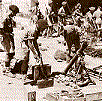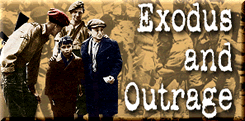Operations Agatha & Shark
A coup by the Irgun was made possible by the ban of the carrying of weapons for off duty personnel as the Irgun burst into the officers' club dragging away five officers, of whom three were of the 6th Airborne, one of the R.E.M.E. and one of the R.A.F. Two were released after four days in shackles. The fate of the others, it was announced in an Israeli broadcast, depended on the fate of two gangsters of the Irgun in prison awaiting the death sentence for the unsuccessful raid on the 3rd Hussar's camp on March 6th.
Since so little cooperation in the search of gangsters was forth-coming from the Jewish population in the regard of the abduction of the five British officers from the officers club on June 18th, it was decided that a mass search of all organisations must be made including that of the Jewish agency. At the same time a long list of all suspects to be arrested was prepared. The operation was called 'Agatha' and it involved practically every army unit. It was carefully planned so there was no reconnaissance and groups were disguised as informal gatherings. On Friday June 28th, there was a lavish display of 'top brass' at the Jerusalem Horse Show.

Around 4am the next morning, members of the Royal Corps of Signals entered telephone exchanges and placed their operators under guard. It had been suspected for a while that the Jewish operators had been passing on information to the various gangs. Troops meanwhile were climbing out of the vehicles and taking up positions at their cordon stations, Jerusalem, Haifa and Tel Aviv. Troops, accompanied by policemen, entered the homes of the people on the wanted list. Complete surprise was achieved and there were some desperate scuffles to break the cordon, resist arrest, or prevent entry to some secret arms store. Shots had to be fired at times but certainly in the case of the 6th Airborne, who were astride the heart of the resistance, it was found that warning shots fired in the air could be effective. 2,718 persons were arrested as a result of this great swoop. Among them were Mr. David Ben-Gurion and other leading members of the Jewish Agency and many incriminating documents were found.
On the heels of this blow to the political leadership came one at their recognised army, the Hagana. It stemmed from a small chance discovery of arms in a village near Haifa. The 2nd Cheshire Regiment began a thorough search. With the aid of mine detectors and by shear perseverance, thirty-three caches were unearthed from beneath the ground or in the recesses in such buildings as nurseries and shelters, including close on 600 weapons, including Brens and mortars, half a million rounds of ammunition, and a quarter ton of explosive. There was now a good prospect of reducing the whole of Hagana to impotence but the Irgun were too skilled in the art of security to be seriously smitten by Agatha and to prove it they staged the most resounding blow of all.

On Monday July 22nd, they blew up the King David Hotel. Either through complacency or part of the deliberate policy of playing down the emergency, the hotel still functioned as such. The 31st Brigade threw a cordon around the area and conducted a search with all possible speed but could do no more than arrest suspects for questioning. There was evidence enough to show that the raid on the hotel had been planned in Tel Aviv, which was a city of 170,000 inhabitants, nearly all Jewish. It was decided to seal the city, search every house, and screen every inhabitant. The operation was named 'Shark' and was more ambitious than 'Agatha', for not only did the population have to be screened without warning but such essential services as the provision of food, the removal of rubbish, and the care of the sick would have to be maintained by military means for at least four days.
The conducting role was given to the 6th Airborne Division, with such other troops under command as required and the total engaged came to sixteen infantry battalions, three armoured, two artillery regiments, two field squadrons, a field ambulance, a divisional column of the R.A.S.C. and Military Police. Tuesday, July 30, was picked as D-Day, eight days after the explosion. The sea flanked one side of Tel Aviv and police and naval launches kept this flank under close watch.

Approaching by different routes, the Brigades laid the outer cordon in darkness. It was later admitted by Menachem Begin, leader of the Irgun, that he and some of his gang were caught inside the cordon. As dawn broke troops paraded the streets to announce and enforce the curfew, while others took up position to form inner cordon rings, slicing the city into area's between which there could be no communication. The mammoth task of search and clearance began. Street by street, parties gained entrance into each house, assembled the occupants into one room, checked their identity cards, and then searched every part of the house accompanied by the householder. All except the very old and the very young were taken to Battalion Headquarters screening. The search lasted for three and a half days and was marked by an absence of bitter and violent resistance as was encountered during Operation Agatha. 787 people were removed to detention and five arms dumps discovered, of which the largest was in the basement of the Great Synagogue. There was no breakdown of the supply and health services and no incident bringing disrepute to the troops.
General Cassels had good cause to congratulate his men on a difficult and laborious task involving great tolerance and cheerfulness on the part of the troops but Begin had safely preserved his freedom by lying up in a secret cranny and he claims to have only lost two of his high ranking assistants, one of whom was detected beneath the disguise of a Rabbi. There were signs that the King David Hotel tragedy had caused genuine disgust against the terrorist groups within the Jewish movement. Indeed, Ben-Gurion went as far as saying,' The Irgun is the enemy of the people'. The drive against Hagana was called off. Security forces had found many arms caches and it seemed pointless to continue as survival had kept the Hagana quiet from then onwards.



